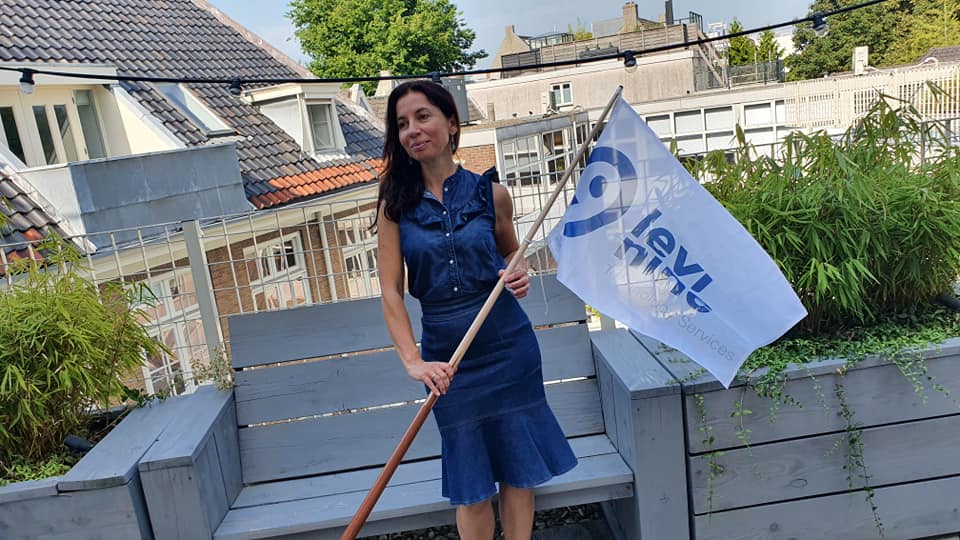Hello! My name is Yulia, and I’m an Office Manager at Levi9. Before the full-scale war, I lived in Kyiv, but for the past two months, my sister and I have been immersing ourselves in the rhythm of life in the Netherlands. We were planning to stay in Italy, but it was challenging to rent accommodation there for a few months, and we didn’t want to believe that we wouldn’t be returning home anytime soon (by the way, we have already returned to the Kyiv office).
The Levi9 team helped me find a roof over my head by offering relocation to the Netherlands, where our main office is located. Here, everyone is counting the days until our victory and navigating the intricacies of life in a different culture.
To ensure that Ukrainian migrants don’t start from scratch in the Netherlands, my colleague Natalia Kot, Talent Associate at Levi9, and I have created a guide based on our observations and insights.
Finding a place to live is easy and fast
Renting accommodation in the Netherlands can be expensive, challenging, and time-consuming, especially in major cities like Amsterdam, which are often overcrowded. There are very few available rental options there, so it’s better to consider smaller cities where the difference in infrastructure is insignificant, but the prices are significantly lower. Locals recommend using the ad aggregatorsplatforms like Funda.nl or Pararius.
For Ukrainians who have come to the Netherlands for a limited period, there are accessible and even free housing options. For example, migrants can stay with locals, known as a host family. The Takecarebnb website has many people willing to host Ukrainians. All hosts have undergone verification and accept guests under an official contract.
Volunteers also assist with the housing search. The centers are located at the following addresses:
- Amsterdam, Centraal Station, Stationsplein 7
- Rijswijk (The Hague), Broodfabriek, Volmerlaan 12, 2288 GD
- Eindhoven, Microlab Strijp-S
- Maastricht, MECC Evenementencentrum
- Utrecht, Jaarbeurs, Hal 7
As for my sister and I, we, along with our colleagues and their families (more than 30 people in total) lived in an apartment complex in The Hague, which had everything you might need. Friendly Dutch people even found bicycles for us and organized a celebration for Easter and the Vyshyvanka Day:)
What documents will be needed?
After arriving in the Netherlands, Ukrainians can obtain a BSN (Burgerservicenummer – which is the identification number for Dutch residents) also known as temporary protection. It is optional, but I recommend obtaining a BSN even if you don’t plan to stay in the Netherlands for a long time. It simplifies access to medical services and other social services that are not available to tourists in the kingdom but may be needed after a few months.
In addition, with temporary protection status, you have the right to insurance, education, and can legally work in the Netherlands.
All Ukrainians under temporary protection in the Netherlands who have already obtained a BSN are waiting for a residence permit in the form of a sticker placed in their international passport. After receiving the residence permit, you can return home for a limited period and for valid reasons, such as bringing relatives or transporting belongings. The allowed duration of stay in Ukraine is currently unknown.
To apply for temporary protection, you can visit the same addresses where you can receive assistance with housing:
- Amsterdam, Centraal Station, Stationsplein 7
- Rijswijk (The Hague), Broodfabriek, Volmerlaan 12, 2288 GD
- Eindhoven, Microlab Strijp-S
- Maastricht, MECC Evenementencentrum
- Utrecht, Jaarbeurs, Hal 7
An interesting job market
Finding at least some job in the Netherlands is not difficult if you know English or Dutch. However, even in such cases, locals offer assistance.
The laws and practices in the IT sector in the Netherlands differ somewhat from those in Ukraine. Locals mention that there is not as aggressive headhunting as in Ukraine, and Dutch employers are more modest. Most job vacancies are posted on LinkedIn or localized job search websites such as Indeed or Monsterboard. There are also local platforms like Nationalevacaturebank or SimplyHired, which are the largest Dutch aggregators and are worth checking periodically for job opportunities.
An interesting insight is that there are no “middle-level” vacancies in the Netherlands. For example, the position of an “Android developer” may encompass both junior and experienced professionals. However, the compensation will vary significantly, so it’s worth clarifying this aspect with HR managers from the beginning.
Getting around the city and the country
In general, the Netherlands has an intuitive and convenient public transportation system. To travel in and between cities, it is enough to buy one card and periodically replenish it. For Ukrainians, public transportation in the Netherlands is currently free, and for discounted travel, you only need to show your Ukrainian passport.
For intercity trains, however, you can get a free ticket only once within 24 hours of entering the country.
Free and useful benefits for Ukrainians
The Dutch are friendly and generous, happy to help anyone who needs it. For example, the locals have launched an initiative to exchange things for Ukrainians: you create an ad with a request on the website, and caring locals respond quickly and give the item for free or for a symbolic amount.
For locals, it is generally normal to give away used items and share them with others: they value the willingness to help more than material things.
Some museums offer discounts for IDPs from Ukraine, and sometimes you can visit an exhibition for free, such as the Mosso Museum in Amsterdam. I recommend asking about it at the box office or looking closely at the announcements around. Local communities also organize free events for Ukrainians, such as screenings of Ukrainian-language movies or fairs. You have to follow the news.
Ukrainian community in the Netherlands: Where to find our people
Telegram is now the most convenient tool for finding Ukrainian communities anywhere. I advise you to pay attention to the Ukrainian diaspora channel, where you will find up-to-date information about events, initiatives and activities for Ukrainians in the Netherlands.
In addition, you can find announcements in the chat about the date, place, and topic of planned rallies in support of Ukraine. Together, we periodically go to peaceful demonstrations and remind Europeans of the horrors of the war in Ukraine.
There is also a chat group on Telegram for internally displaced persons from Ukraine – Ukrainians in the Netherlands. There you can ask questions, ask for help, or, on the contrary, offer help.
I want to volunteer in the Netherlands. Where to go and what to do?
To volunteer, it is, first of all, desirable to have at least a basic knowledge of English. In most major cities, there are centers for immigrants where new helpers will be welcome – just visit one of them at the address above and offer your help.
For example, my colleague Natalia, a Talent Associate in our company, applied to a volunteer center in The Hague and now works as a translator twice a week from 9:00 to 13:00.
Education and leisure for children
Every child who arrives in the Netherlands has the right to education. However, it may take some time for young Ukrainian children to enroll in an educational institution. Currently, the kingdom has received many refugees, and organizing the educational process for all of them poses a challenge for the government.
Nevertheless, parents can already enroll their child in a Dutch school in their local area. Usually, a simple phone call to schedule a meeting is sufficient. During the meeting, you can discuss schooling options and admission requirements. For children older than 12, they may be offered an IQ test to determine their level.
Volunteer centers or representatives of the Ukrainian diaspora will have more information and can provide advice on finding a school that meets your specific needs and explain the enrollment procedure in more detail.
Financial matters: Currency, money, and prices
The currency in the Netherlands is the Euro, and you can withdraw money from an alternative currency card with a minimal fee at ATMs, which are easily found near grocery stores. It’s best to have smaller denominations when making payments since smaller shops may not always have change available, and they may not accept bills over 50 euros, for example.
Prices in the Netherlands are generally high, as it is one of the most expensive countries in Europe. However, you can find relatively affordable supermarkets with pleasant discounts. A useful application called TooGoodToGo collects information about stores and restaurants that have products approaching their expiration date, allowing you to save money by purchasing them.
In the Netherlands, Maestro cards are more widely accepted, while traditional cards like Visa and Mastercard are less commonly used. You can obtain a Maestro debit card through the online bank Bunq. Simply download the appropriate application, register, and select the “Easy Bank” account. After confirming your identity with a valid Ukrainian passport or other identification documents, Bunq will automatically open your free account.
Cultural differences matter
In addition to basic safety tips, such as not trusting strangers and always checking the person offering help, I would recommend familiarizing yourself with the culture and customs of the country you are planning to travel to.
The Dutch and I have different customs and understanding of norms, and in some situations, reacting according to the “Ukrainian template” will make you look rude. For example, it’s normal for locals to approach a stranger on the street and talk to them. And if you meet someone on the street with a glance, it would be quite appropriate to say hello.
The NET in Nederland platform, a project of the local NPO television, will help you better understand the “genetic code”, mentality, and customs of the Dutch. It contains materials about cultural differences, traditions, and peculiarities of life in the Netherlands. The site is currently available in Dutch and Arabic, but you can automatically translate the page into Ukrainian via Google.
As part of the same initiative, a Facebook page has been created in the Ukrainian language for our refugees. There you will find, for example, reminders about the weekly educational siren that sounds in the territory of the Netherlands every Monday, as well as other useful information. Veel geluk!
In this article:

Office Manager
Levi9









